Book
Agrotopias: An American Literary History of Sustainability (2022, University of North Carolina Press).
* One of the first American literary histories of sustainability
*Challenges the seemingly progressive history of American environmental thought
* Reveals the enduring partnership between racial, eugenic, and agrarian ideas in the U.S.
*Featured on the New Books Network Podcast and the ASLE (Association for the Study of Literature and Environment) EcoCast
*Supported by fellowships from the American Council of Learned Societies (ACLS), the American Association of University Women (AAUW), the American Antiquarian Society, the Institute for Citizens and Scholars, and the First Book Institute at the Center for American Literary Studies at Penn State.
Peer-Reviewed Articles
“Whitman’s Eugenic Sustainability,” ESQ: A Journal of Nineteenth-Century American Literature and Culture 65.4 (December 2019): 692-734.
This essay recasts Whitman, the long-celebrated poet of diversity, as the architect of a disturbingly eugenic conception of American sustainability. It traces an unexamined trend across Whitman’s corpus—a tendency to adapt the agrarian ideal to nineteenth-century concepts of selective breeding and racial improvement. Ultimately, Whitman’s writings offer a much more disturbing story about the emergence of sustainability discourse from its Jeffersonian roots, calling us to reexamine the stories we tell about American environmental thought.
“Slow Interdisciplinarity,” Hybrid Pedagogy, 12 November 2019. Reprinted in Hybrid Teaching: Pedagogy, People, and Politics, ed. Chris Friend (Hybrid Pedagogy, 2021), 19-29. Audiobook released 11 November 2022.
This essay defines the concept of “slow interdisciplinary”: a learner-centered approach to facilitating disciplinary stewardship and permeability in the classroom, the curriculum, and higher education writ large. It draws on recent pedagogical scholarship on open pedagogy, critical instructional design, interdisciplinary teaching, and project-based learning.
“No ‘Rural Bowl of Milk’: Demographic Agrarianism and Unsustainability in Pierre,” Studies in American Fiction 44.1 (Spring 2017): 27-52.
This essay recovers a mid-nineteenth-century sustainability discourse through an analysis of Herman Melville’s novel Pierre (1852) and his ghost-written agricultural report. It argues that a diverse group of 1840s sustainability advocates fantasized about a specifically demographic agrarian ideal–a sprawling, appropriately fertile, American farming population. Melville’s novel depicts the opposite of this ideal, realizing the dystopian nightmares that drove and shaped mid-nineteenth-century sustainability discourse.
“Burger King and Transnational American Studies,” with AnaMaria Seglie. American Studies in Scandinavia 47.2 (November 2015): 103-123.
This article explores the incongruities between transnational American studies as theorized and practiced. Drawing on themes from the 2013 Nordic Association of American Studies (NAAS) conference, it discusses the challenges of practicing “transnational” American studies within specific nation-based and regional communities. These challenges present opportunities for theorizing the divide between American studies and its varying scholarly terrains, especially through international scholarly practice.
*Inspired the roundtable entitled “After Transnational American Studies” at the 2016 Modern Language Association Conference, Austin, TX
“Gothic Fertility in Leonora Sansay’s Secret History,” Early American Literature 50.2 (June 2015): 449-473.
This essay coins the concept of gothic fertility–a literary tendency to combine horrific and reproductive imagery–and discusses its racial, colonial, and ecological implications in Leonora Sansay’s Secret History; or, The Horrors of St. Domingo (1808). Gothic fertility refers to the imagined reproductive instability of creole bodies that blur racial and sexual boundaries in revolutionary Haiti. But gothic fertility also signifies an uncanny, ecological conception of fertility–one that defamiliarizes paracolonial narratives of the Haitian Revolution.
Book Chapters
“‘Against Sustainability’: And Other Provocations for a First-Year Writing-Intensive Seminar,” Climate Consciousness and Environmental Activism in Composition: Writing to Save the World, ed. Joseph Lease (Lexington Books’ Ecocritical Theory and Practice Series, 2020), 175-196.
This essay promotes a new, environmental approach to the writing-intensive classroom, one that embraces a critique of concepts such as “sustainability.” In an era focused on addressing climate change and environmental injustice, this approach may seem counterintuitive. Using Rice University’s first sustainability-focused writing seminar as a case study, this essay discusses critique as an effective pedagogical strategy; it invites students into authentic, ongoing debates about environmental issues and motivates them to develop their own initiatives and responses. Bringing together scholarship on ecocomposition, critical pedagogy, and community engagement, this essay also examines the role of “sustainability” within writing-intensive programs and higher education more broadly.
Selected Public Writing
“Beyond Utopian Fantasies: Confronting the Environmental Here-and-now.” Association for the Study of Literature and Environment (ASLE) Featured Research and Projects, November 2022.
This essay articulates the central argument of Agrotopias (2022), contextualizing the book within the current landscape of climate activism and intentional communities. It also connects Agrotopias to pedagogical challenges in environmental studies classes today, highlighting the importance of critique and “slow interdisciplinarity” in the project-based classroom.
“Teaching the Unfamiliar.” Just Teach One project, Common-Place: The Journal of Early American Life, Spring 2020.
Drawing on the principles of open education, this short piece examines the pedagogical value of The Black Vampyre; A Legend of St. Domingo (1819) in the American literature classroom. While this lesser-known text occasioned new debates about posthumanism, transnationalism, and the gothic, the text’s unfamiliarity gave students permission to experiment, assume authority, and make visible their own development as scholarly collaborators and thinkers. It also gave them an opportunity to contribute to The Open Anthology of Earlier American Literature, a student-authored, open-access, digital anthology and an ongoing project at Plymouth State.
“Against ‘Product-Based Learning’: Open Texts are Never Finished.” Open Pedagogy Notebook, 16 September 2018.
This piece questions the focus on “products” in discussions of project-based learning in higher education. It encourages educators to utilize open textbooks as a way of making visible the messy and imperfect process of learning. In Abby’s own courses, students have focused on the following processes: 1. Expanding an Open Anthology of Earlier American Literature in a course called “Rethinking Early American Literature” and 2. developing a handbook for an upper-level “Critical Theory” course, which students have titled The Student Theorist: An Open Handbook of Collective College Theory. Both of these texts have enabled students to think about courses as dynamic, continuous processes rather than hermetically sealed, self-contained units—as conversations that build and become more complex each year.
Book Reviews
Invited review of Dewey H. Hall and Jillmarie Murphy, eds., Gendered Ecologies: New Materialist Interpretations of Women Writers in the Long Nineteenth Century (Clemson: Clemson UP, 2020). Legacy: A Journal of American Women Writers, 38.1-2 (2021): 180.
*Discussion of nineteenth-century women writers in the context of ecocritical, feminist, and new materialist theories
Invited review of Greta LaFleur, The Natural History of Sexuality in Early America (Baltimore: Johns Hopkins UP, 2018). ISLE: Interdisciplinary Studies of Literature and the Environment 26.3 (Summer 2019): 824-826.
*Discussion of LaFleur’s environmental theory of sexuality across the long eighteenth century
Invited review of Irina Aristarkhova, The Hospitality of the Matrix: Philosophy, Biomedicine, and Culture (New York: Columbia UP, 2012). philoSOPHIA: A Journal in Continental Feminism 4.2 (Summer 2014): 239-243.
*Discussion of Aristarkhova’s conception of hospitality within feminist, philosophical, and biomedical discourses
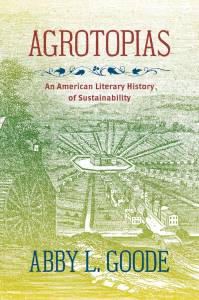
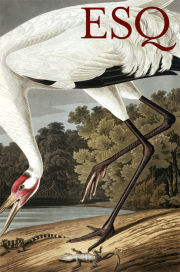

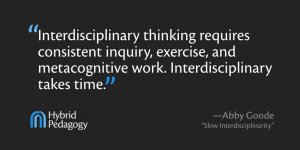
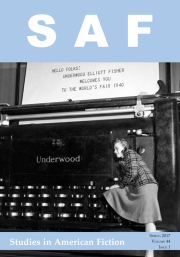
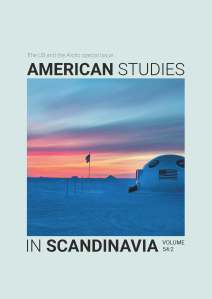
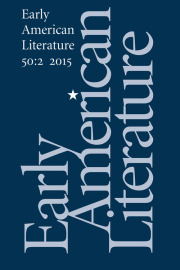
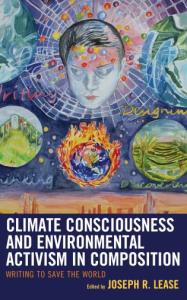
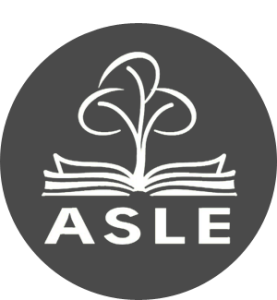

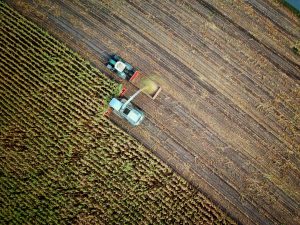
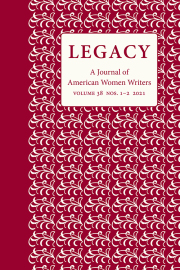
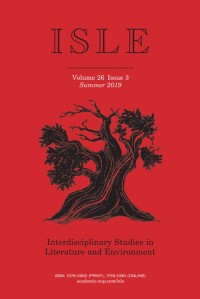
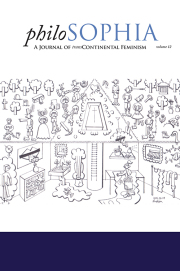
You must be logged in to post a comment.